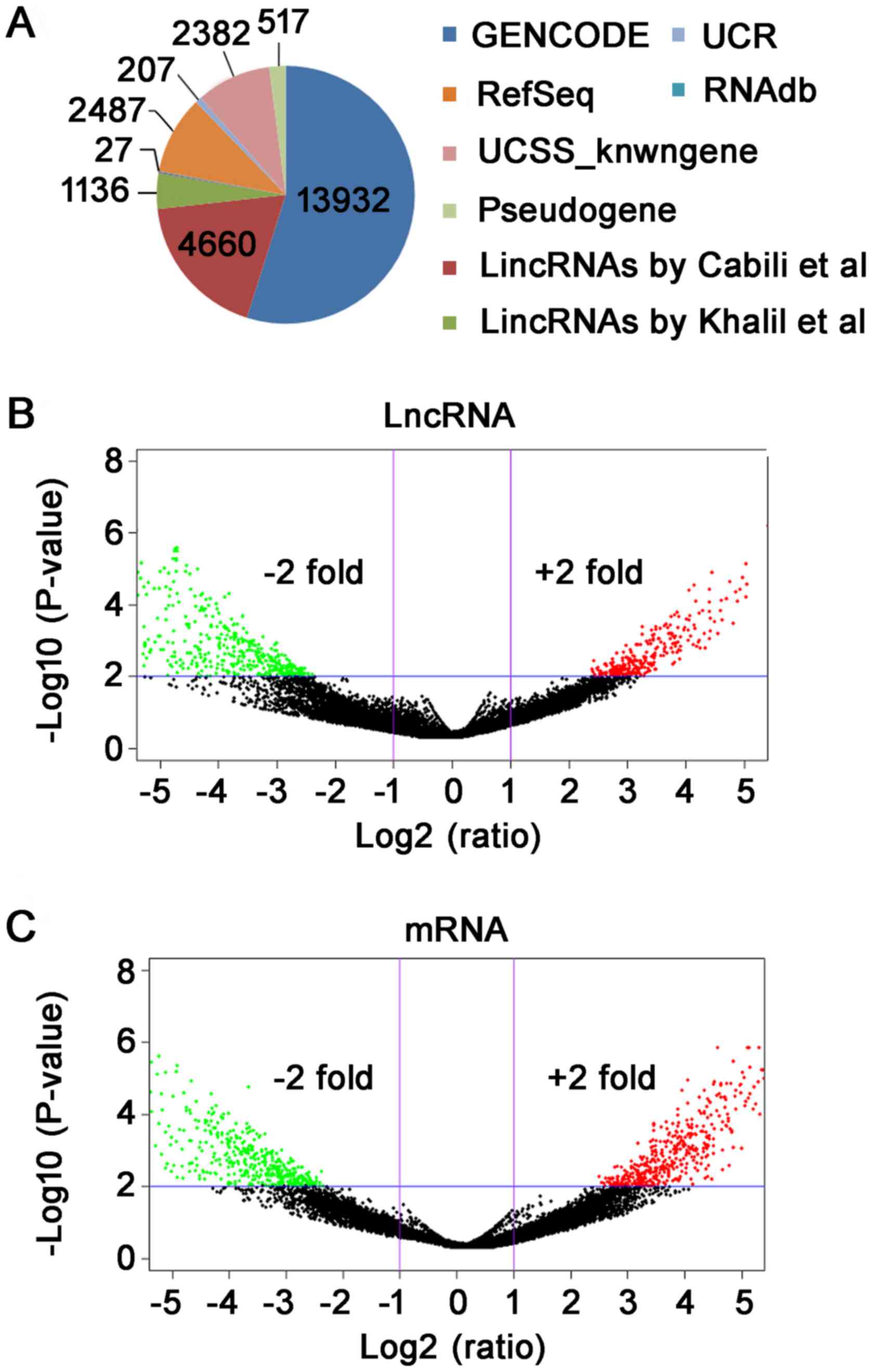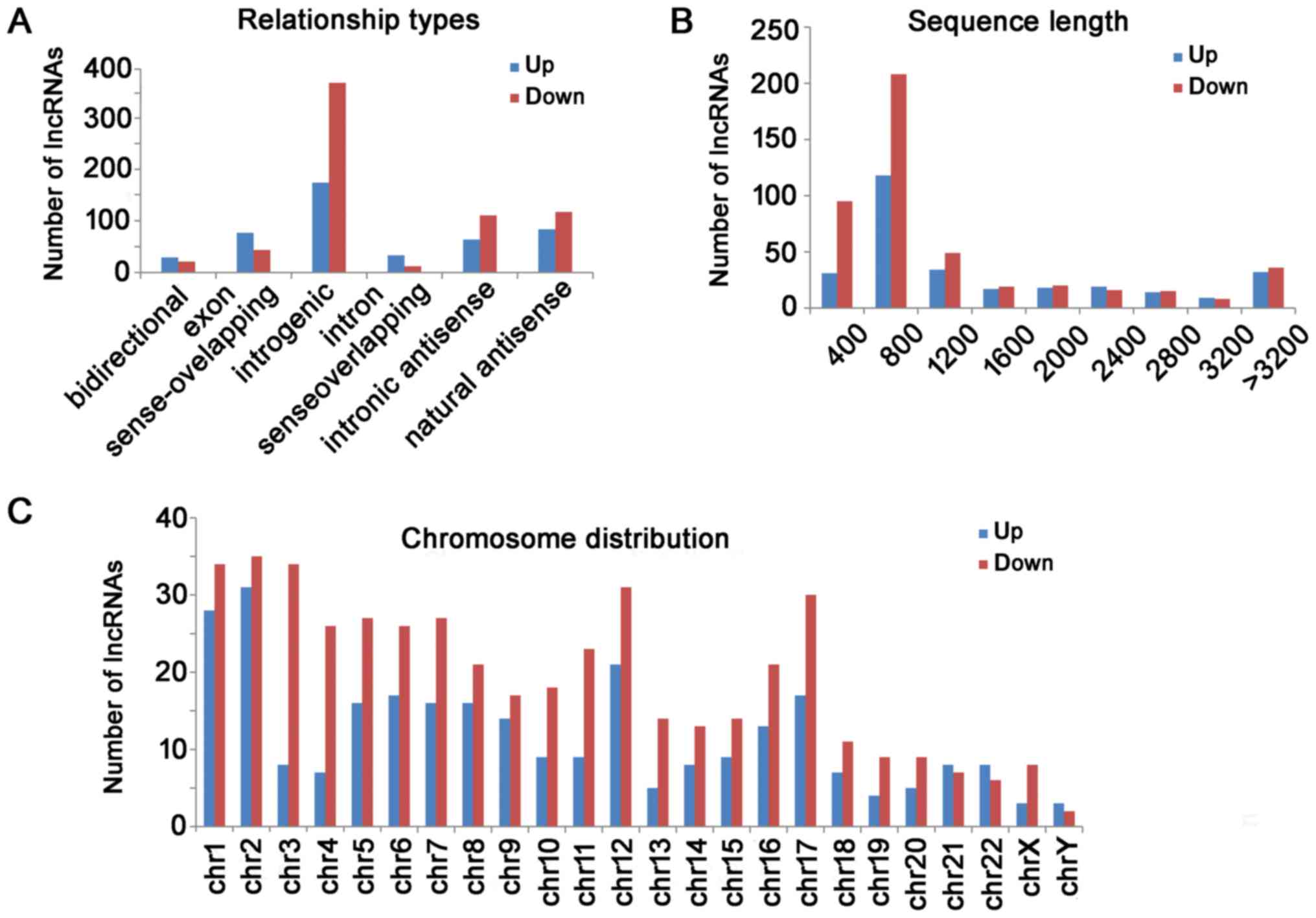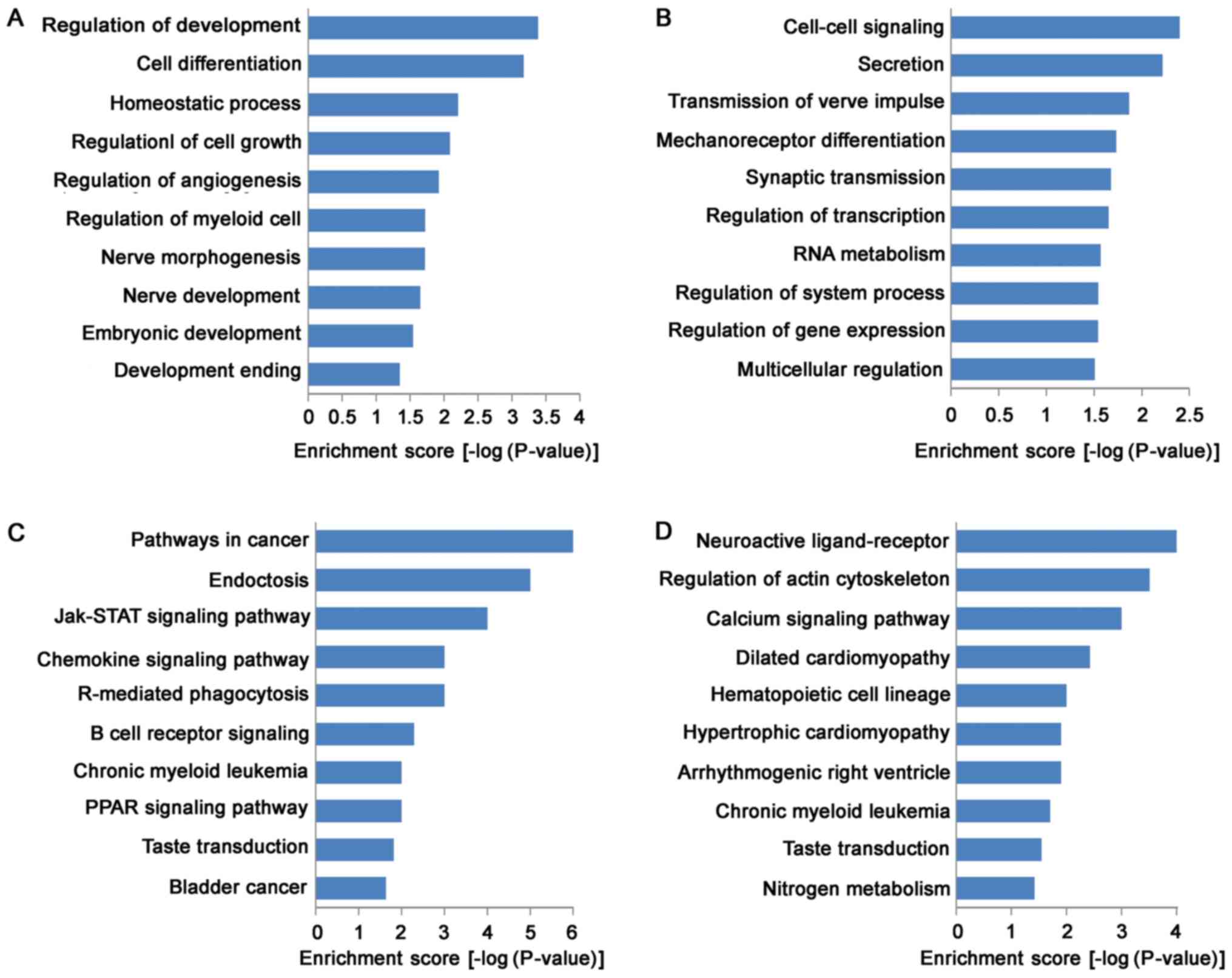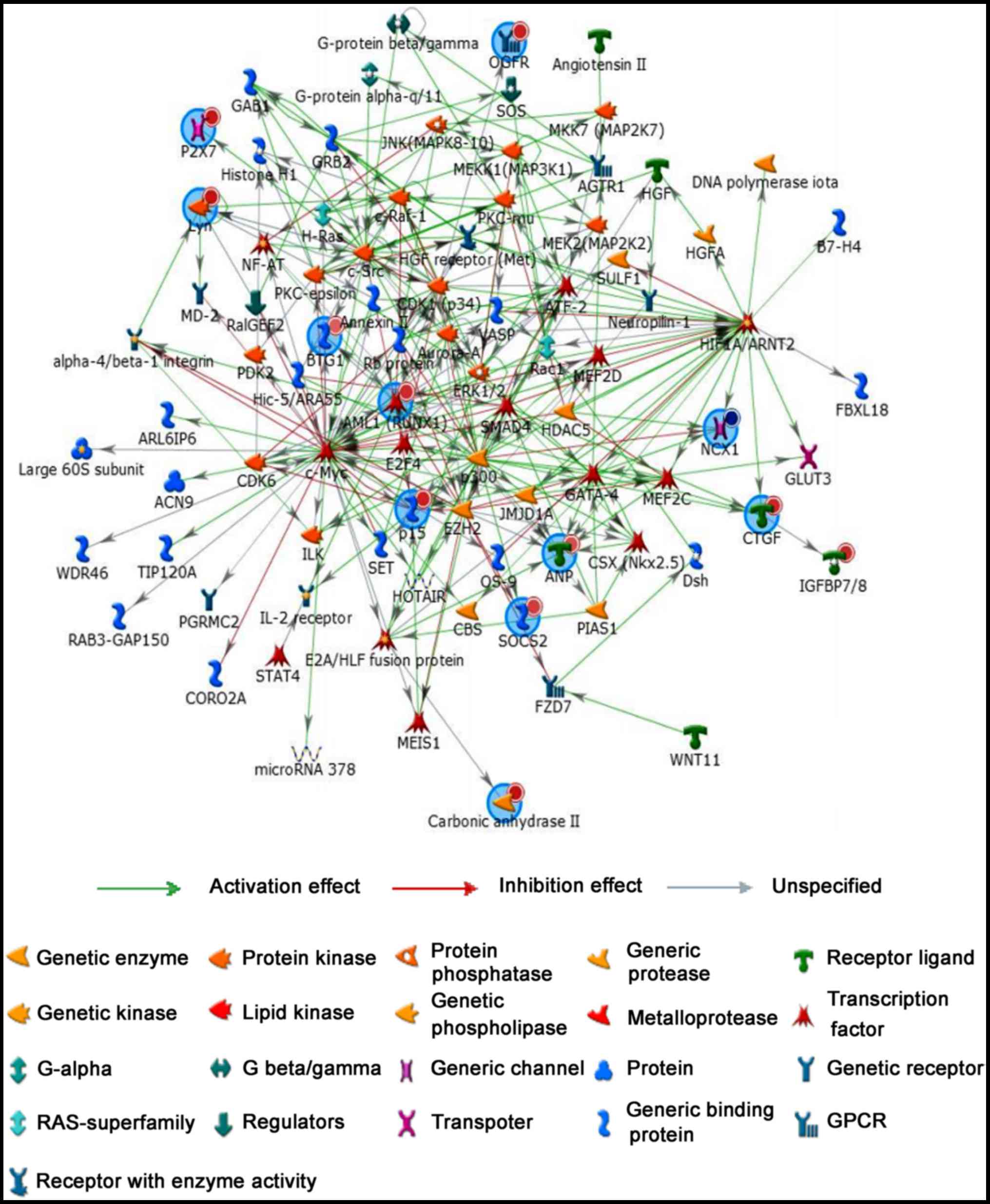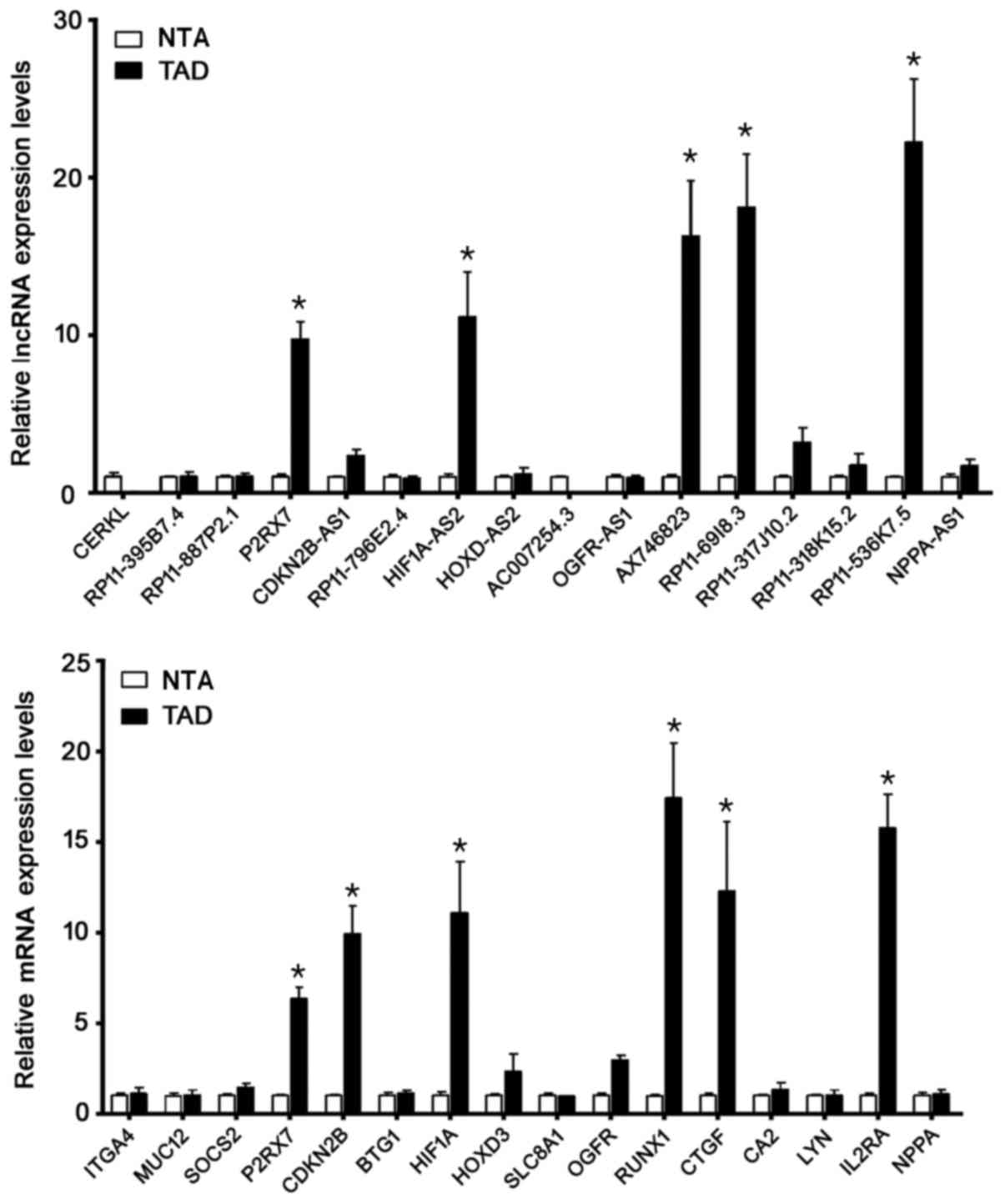|
1
|
Clouse WD, Hallett JW Jr, Schaff HV,
Spittell PC, Rowland CM, Ilstrup DM and Melton LJ III: Acute aortic
dissection: Population-based incidence compared with degenerative
aortic aneurysm rupture. Mayo Clin Proc. 79:176–180. 2004.
View Article : Google Scholar : PubMed/NCBI
|
|
2
|
Leitman IM, Suzuki K, Wengrofsky AJ,
Menashe E, Poplawski M, Woo KM, Geller CM, Lucido D, Bernik T,
Zeifer BA and Patton B: Early recognition of acute thoracic aortic
dissection and aneurysm. World J Emerg Surg. 8:472013. View Article : Google Scholar : PubMed/NCBI
|
|
3
|
Batista PJ and Chang HY: Long noncoding
RNAs: Cellular address codes in development and disease. Cell.
152:1298–1307. 2013. View Article : Google Scholar : PubMed/NCBI
|
|
4
|
Kornienko AE, Guenzl PM, Barlow DP and
Pauler FM: Gene regulation by the act of long non-coding RNA
transcription. BMC Biol. 11:592013. View Article : Google Scholar : PubMed/NCBI
|
|
5
|
Ishii N, Ozaki K, Sato H, Mizuno H, Saito
S, Takahashi A, Miyamoto Y, Ikegawa S, Kamatani N, Hori M, et al:
Identification of a novel non-coding RNA, MIAT, that confers risk
of myocardial infarction. J Hum Genet. 51:1087–1099. 2006.
View Article : Google Scholar : PubMed/NCBI
|
|
6
|
Miner GH, Faries PL, Costa KD, Hanss BG
and Marin ML: An update on the etiology of abdominal aortic
aneurysms: Implications for future diagnostic testing. Expert Rev
Cardiovasc Ther. 13:1079–1090. 2015. View Article : Google Scholar : PubMed/NCBI
|
|
7
|
He Q, Tan J, Yu B, Shi W and Liang K: Long
noncoding RNA HIF1A-AS1A reduces apoptosis of vascular smooth
muscle cells: Implications for the pathogenesis of thoracoabdominal
aorta aneurysm. Pharmazie. 70:310–315. 2015.PubMed/NCBI
|
|
8
|
Wang S, Zhang X, Yuan Y, Tan M, Zhang L,
Xue X, Yan Y, Han L and Xu Z: BRG1 expression is increased in
thoracic aortic aneurysms and regulates proliferation and apoptosis
of vascular smooth muscle cells through the long non-coding RNA
HIF1A-AS1 in vitro. Eur J Cardiothorac Surg. 47:439–446. 2015.
View Article : Google Scholar : PubMed/NCBI
|
|
9
|
Duggirala A, Delogu F, Angelini TG, Smith
T, Caputo M, Rajakaruna C and Emanueli C: Non coding RNAs in aortic
aneurysmal disease. Front Genet. 6:1252015. View Article : Google Scholar : PubMed/NCBI
|
|
10
|
ENCODE Project Consortium, . Birney E,
Stamatoyannopoulos JA, Dutta A, Guigó R, Gingeras TR, Margulies EH,
Weng Z, Snyder M, Dermitzakis ET, et al: Identification and
analysis of functional elements in 1% of the human genome by the
ENCODE pilot project. Nature. 447:799–816. 2007. View Article : Google Scholar : PubMed/NCBI
|
|
11
|
Dudzinski DM and Isselbacher EM: Diagnosis
and management of thoracic aortic disease. Curr Cardiol Rep.
17:1062015. View Article : Google Scholar : PubMed/NCBI
|
|
12
|
Papait R, Kunderfranco P, Stirparo GG,
Latronico MV and Condorelli G: Long noncoding RNA: A new player of
heart failure? J Cardiovasc Transl Res. 6:876–883. 2013. View Article : Google Scholar : PubMed/NCBI
|
|
13
|
Liu L, An X, Li Z, Song Y, Li L, Zuo S,
Liu N, Yang G, Wang H, Cheng X, et al: The H19 long noncoding RNA
is a novel negative regulator of cardiomyocyte hypertrophy.
Cardiovasc Res. 111:56–65. 2016. View Article : Google Scholar : PubMed/NCBI
|
|
14
|
Zhao Y, Feng G, Wang Y, Yue Y and Zhao W:
Regulation of apoptosis by long non-coding RNA HIF1A-AS1 in VSMCs:
Implications for TAA pathogenesis. Int J Clin Exp Pathol.
7:7643–7652. 2014.PubMed/NCBI
|
|
15
|
Magistri M, Faghihi MA, St Laurent G III
and Wahlestedt C: Regulation of chromatin structure by long
noncoding RNAs: Focus on natural antisense transcripts. Trends
Genet. 28:389–396. 2012. View Article : Google Scholar : PubMed/NCBI
|
|
16
|
Leung A, Trac C, Jin W, Lanting L, Akbany
A, Sætrom P, Schones DE and Natarajan R: Novel long noncoding RNAs
are regulated by angiotensin II in vascular smooth muscle cells.
Circ Res. 113:266–278. 2013. View Article : Google Scholar : PubMed/NCBI
|
|
17
|
Freedman JE and Miano JM: National Heart,
Lung, and Blood Institute Workshop Participants*: Challenges and
opportunities in linking long noncoding RNAs to cardiovascular,
lung, and blood diseases. Arterioscler Thromb Vasc Biol. 37:21–25.
2017. View Article : Google Scholar : PubMed/NCBI
|
|
18
|
Huang DW, Sherman BT and Lempicki RA:
Bioinformatics enrichment tools: Paths toward the comprehensive
functional analysis of large gene lists. Nucleic Acids Res.
37:1–13. 2009. View Article : Google Scholar : PubMed/NCBI
|
|
19
|
Liu K, Fang C, Shen Y, Liu Z, Zhang M, Ma
B and Pang X: Hypoxia-inducible factor 1a induces phenotype switch
of human aortic vascular smooth muscle cell through PI3K/AKT/AEG-1
signaling. Oncotarget. 8:33343–33352. 2017.PubMed/NCBI
|
|
20
|
Ungvari Z, Valcarcel-Ares MN, Tarantini S,
Yabluchanskiy A, Fülöp GA, Kiss T and Csiszar A: Connective tissue
growth factor (CTGF) in age-related vascular pathologies.
Geroscience. 39:491–498. 2017. View Article : Google Scholar : PubMed/NCBI
|
|
21
|
Sachdeva J, Mahajan A, Cheng J, Baeten JT,
Lilly B, Kuivaniemi H and Hans CP: Smooth muscle cell-specific
Notch1 haploinsufficiency restricts the progression of abdominal
aortic aneurysm by modulating CTGF expression. PLoS One.
12:e01785382017. View Article : Google Scholar : PubMed/NCBI
|
|
22
|
Leeper NJ, Raiesdana A, Kojima Y, Kundu
RK, Cheng H, Maegdefessel L, Toh R, Ahn GO, Ali ZA, Anderson DR, et
al: Loss of CDKN2B promotes p53-dependent smooth muscle cell
apoptosis and aneurysm formation. Arterioscler Thromb Vasc Biol.
33:e1–e10. 2013. View Article : Google Scholar : PubMed/NCBI
|
|
23
|
Chiao CW, Tostes RC and Webb RC: P2X7
receptor activation amplifies lipopolysaccharide-induced vascular
hyporeactivity via interleukin-1 beta release. J Pharmacol Exp
Ther. 326:864–870. 2008. View Article : Google Scholar : PubMed/NCBI
|
|
24
|
Chiao CW, da Silva-Santos JE, Giachini FR,
Tostes RC, Su MJ and Webb RC: P2X7 receptor activation contributes
to an initial upstream mechanism of lipopolysaccharide-induced
vascular dysfunction. Clin Sci (Lond). 125:131–141. 2013.
View Article : Google Scholar : PubMed/NCBI
|
|
25
|
Pahl MC, Erdman R, Kuivaniemi H, Lillvis
JH, Elmore JR and Tromp G: Transcriptional (ChIP-Chip) analysis of
ELF1, ETS2, RUNX1 and STAT5 in human abdominal aortic aneurysm. Int
J Mol Sci. 16:11229–11258. 2015. View Article : Google Scholar : PubMed/NCBI
|
|
26
|
Li L, Yang SH, Yao Y, Xie YQ, Yang YQ,
Wang YH, Yin XY, Ma HD, Gershwin M and Lian ZX: Block of both TGF-β
and IL-2 signaling impedes Neurophilin-1+ regulatory T cell and
follicular regulatory T cell development. Cell Death Dis.
7:e24392016. View Article : Google Scholar : PubMed/NCBI
|
|
27
|
Fatica A and Bozzoni I: Long non-coding
RNAs: New players in cell differentiation and development. Nat Rev
Genet. 15:7–21. 2014. View
Article : Google Scholar : PubMed/NCBI
|
|
28
|
Jiang X and Ning Q: The emerging roles of
long noncoding RNAs in common cardiovascular diseases. Hypertens
Res. 38:375–379. 2015. View Article : Google Scholar : PubMed/NCBI
|















